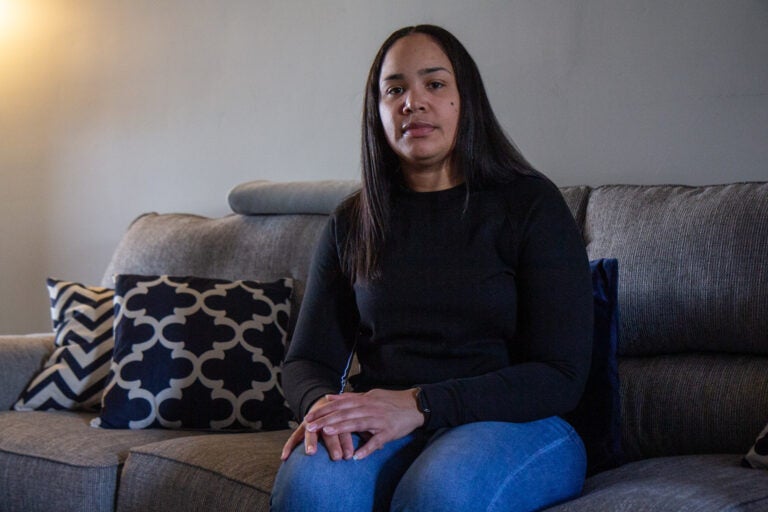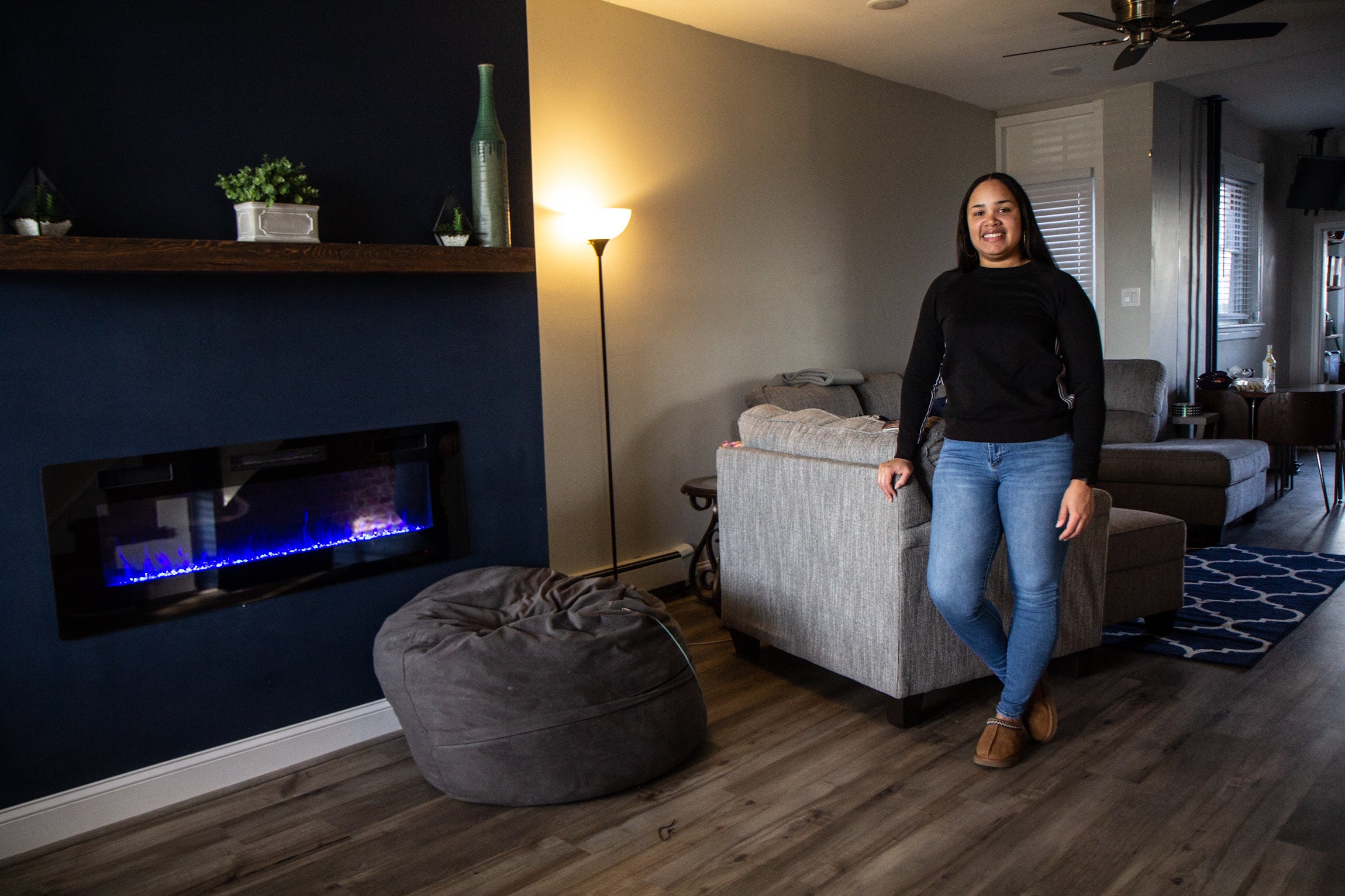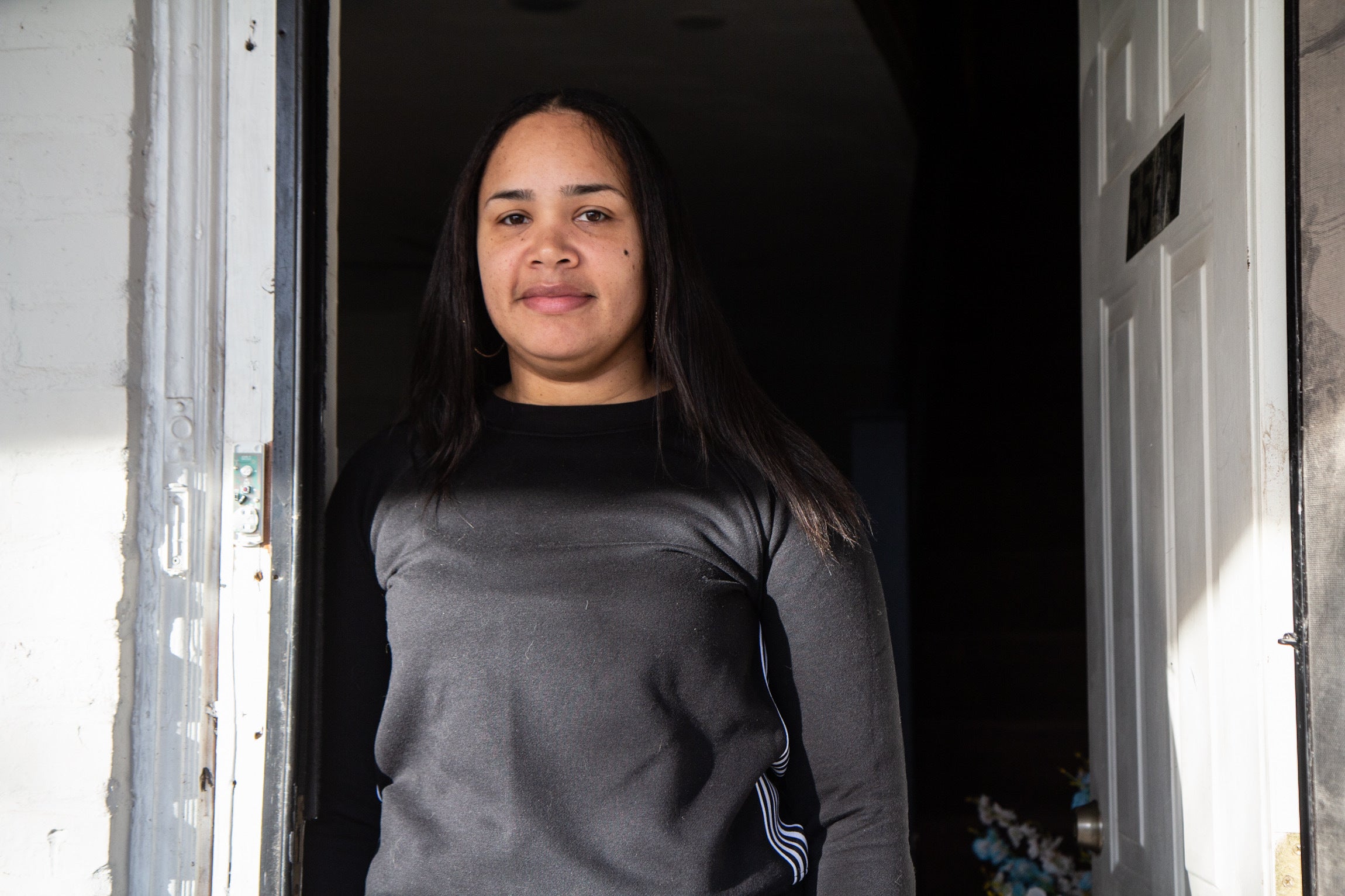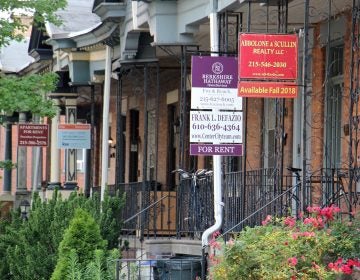Black homeowners refinance less and pay more for mortgages, new data reveals
A Federal Reserve Bank of Atlanta report found Black and non-white Hispanic homeowners paid more interest on their mortgages.

Jessica Ramos at her home in West Philadelphia. (Kimberly Paynter/WHYY)
Jessica Ramos, born and raised in Southwest Philadelphia, started her journey to homeownership by taking a risk. Without having a lot of money, or family to guide her through the buying process, she bought her first house at 22. She did it all on her own.
Fifteen years later, she’s still in the same house raising her family. But as the housing market surges across the country, in part because of record-low interest rates and buyers looking to work from home, many people in Ramos’ position are refinancing. But Ramos isn’t convinced. In her eyes, it’s too much of a gamble.
“I just don’t think it will work for me,” said Ramos, who is Black. “I don’t want to go through that headache. It’s just so many things that make me think I won’t have a fair shot.”
A new report from the Federal Reserve Bank of Atlanta shows that Black and non-white Hispanic homeowners paid interest rates that are almost 0.5% higher than those paid by non-Hispanic white borrowers between 2005 and 2020 — and a main factor in why is differing rates of refinancing.
Black and non-white Hispanic borrowers face certain challenges more than their white counterparts including, on average, lower credit scores, equity, and income. But even when all that is adjusted for, Black and non-white Hispanic borrowers refinance less overall compared to their white counterparts, who are “more likely to exploit lower interest rates … (and) benefit more from monetary expansions,” according to the report.
The national study found that even if lenders completely ignored risk and race when they priced new loans, Black and non-white Hispanic borrowers would still pay more than 0.3% above what their white counterparts pay because they don’t apply for refinancing as often.
The pattern plays out in Philadelphia
In Philadelphia, similar racial disparities play out in the local mortgage market, according to Home Mortgage Disclosure Act data.
In 2019, more than half of white applicants for conventional loans refinanced, compared to only 39% of Black applicants. Twice as many white people applied compared to Black people.
Almost 90% of white people who got refinanced took a conventional loan compared to less than 70% for Black people. Black people get denied for refinancing at almost twice the rate compared to white people. Black people went with government-insured loans — which tend to be more expensive — more often than white people.
“It is both that [Black people] apply less and then when they apply, they end up with a lower approval rate,” Ira Goldstein, president of Policy Solutions at Reinvestment Fund said.

Ramos explained her hesitancy to refinance is a result of not being as informed as she’d like to be and a general mistrust of lending institutions. The institutional legacies of redlining, predatory lending, and other forms of racism over the past few decades make her wary of doing anything with her house other than just paying her mortgage.
Michael Froehlich, managing attorney for the homeownership and consumer rights unit at Community Legal Services, said Ramos’ concerns reflect those he’s heard from other clients.
“Black and brown homeowners, in our experience, are often skeptical of mortgage companies and that’s totally understandable,” he said. “Even when Black and brown homeowners know about these historically low-interest rates, there’s trauma that’s often been experienced … It causes a great deal of hesitancy for these homeowners to go and refinance.”
When Ramos first considered taking the plunge to buy a house, it was because she didn’t want to pay rent. She knew she didn’t have a lot of money for a downpayment yet, but she also knew she could take advantage of programs for first-time homebuyers. She was living in her mother’s house and wanted to move. She knew she could rent a place but couldn’t fathom paying rent while saving up for a house so she just went for it.
“I didn’t know about getting inspections and things like that and [the house] was a quick flip,” she said. “I quickly realized that a lot of stuff was wrong, like electric and things like that.”
About five years after buying, she refinanced using a company she found through Google search because she didn’t have any strong banking relationships and doesn’t have any friends or relatives who own homes other than her mother, who has never refinanced. She said the refinance didn’t change her bill much and she considered it a waste of time. Reflecting on it, she thinks she may have made the jump at the wrong time but doesn’t want to rock the boat and try again.
“I don’t think I’ve arrived yet at really understanding so I could be doing things in the best way,” Ramos said. “That’s still a road I’m on. It wasn’t something my mom could tell me because she didn’t know. It’s trial and error.”
But even with her doubts about her knowledge, she is passing on the things she learned the hard way to her teenage daughter, Munirah Small. She’s emphasizing the importance of saving money for a hefty down payment to reduce interest charges and telling her to think about the location and the schools in an area before buying.
“The thing you use to build your wealth is property,” Ramos said.

The federal study suggests that Black and non-white Hispanic borrowers would be able to accrue more wealth if barriers for refinancing were reduced. But Froehlich said he doesn’t want mortgage companies to return to the days of specifically targeting Black homeowners because, in the past, that led to them giving out risky high-cost mortgage loans. Instead, a better solution would have mortgage companies partner with community-based organizations to build trust with homeowners.
“Everyone should have the opportunity to benefit from monthly mortgage savings,” said Froehlich.
Goldstein thinks mortgage companies and banks should do more outreach about refinancing opportunities when there is a substantial drop between the interest rate on the current mortgage and the marketplace.
“There is an economic disincentive for those that hold the mortgages to make those kinds of offers,” he said. “Nevertheless, in some instances, companies do reach out to their clients … and I think that would be a good market practice.”
He also likes the idea of a law that would create an obligation between lender and client so advice is only given that is in the best interest of the client.
But above all, he thinks it’s about educating people.
“There’s a lot of work we need to do as a society to make sure that everybody understands how these financial instruments work, how these industries work, and how you can operate within them in an effective and efficient way,” he said.

Subscribe to PlanPhilly
WHYY is your source for fact-based, in-depth journalism and information. As a nonprofit organization, we rely on financial support from readers like you. Please give today.








